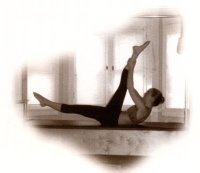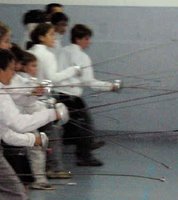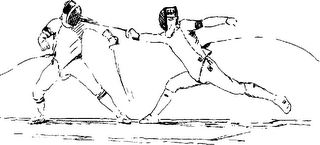 If you are looking for an activity holiday or simply the most enjoyable and most efficient way to get and keep fit and healthy, there cannot be too many forms of exercise that fit the bill better than Pilates and Fencing - and especially when the instructors are as good -- and as charming as Robyn and Patrick!
If you are looking for an activity holiday or simply the most enjoyable and most efficient way to get and keep fit and healthy, there cannot be too many forms of exercise that fit the bill better than Pilates and Fencing - and especially when the instructors are as good -- and as charming as Robyn and Patrick!So, what exactly IS this Pilates phenomenon?
It is an Exercise in Balance : "I must be right. Never an aspirin. Never injured a day in my life. The whole country, the whole world, should be doing my exercises. They'd be happier.", said Jo Pilates in 1965, at the age of 86.

Well, maybe not the whole world, but certainly much of it is experiencing the explosion in demand for Pilates, a method of exercise and physical movement designed to stretch, strengthen, and balance the body. With systematic practice of specific exercises coupled with focused breathing patterns, Pilates has proven itself invaluable not only as a fitness endeavour itself, but also as an important adjunct to professional sports training and physical rehabilitation of all kinds.
Widely embraced among dancers for years, the exercises--"elephant," "swan", the language--"pull navel to spine, find the core connection! and breeaaaathe," and the look--bright-eyed, refreshed, buoyant-without-necessarily-sweating, is popping up in fitness classes, physical therapy offices, corporate retreats, luxury spas and wellness centers across the country. Another fad? A cult for the over-privileged? Think again. With the aging of our world population and the increasing trend toward mindful, moderate health practices, Pilates is more likely to find itself with a wait list at the YMCA, and in your local public schools--shaping the fitness ideals of our next generation.
 Practiced faithfully, Pilates yields numerous benefits. Increased lung capacity and circulation through deep, healthy breathing is a primary focus. Strength and flexibility, particularly of the abdomen and back muscles, coordination-both muscular and mental, are key components in an effective Pilates program. Posture, balance, and core strength are all heartily increased. Bone density and joint health improve, and many experience positive body awareness for the first time. Pilates teaches balance and control of the body, and that capacity spills over into other areas of one's life.
Practiced faithfully, Pilates yields numerous benefits. Increased lung capacity and circulation through deep, healthy breathing is a primary focus. Strength and flexibility, particularly of the abdomen and back muscles, coordination-both muscular and mental, are key components in an effective Pilates program. Posture, balance, and core strength are all heartily increased. Bone density and joint health improve, and many experience positive body awareness for the first time. Pilates teaches balance and control of the body, and that capacity spills over into other areas of one's life.If you are like myself - someone who hates aerobics with a passion, finds doing the circuit in gym beneficial and satisfying -- but utterly boring, but rrealises that a good form of exervice is absolutely crucial to keeping fit, supple and healthy, then look no further: the day you discover Pilates, a new world will open up for you!

And now Pilates has come to the Dordogne as well! Robyn Haigh, from Lalinde,is a well established Pilates teacher in Lalinde as well as in Eymet and the larger Dordogne Perigord. She works both with groups and in one-on-one classes.
And Fencing? Did that activity not go out with the Three Musketeers?

No! Not at all! Fencing, or l'Escrime, became very popular again in France during the last few years -- especially after the 2004 Olympic Games when the French won the most gold medals for fencing.
Fencing is a is a fantastic way to improve balance, co-ordination and flexibility - and it's great fun as well!
There are three types of fencing - epee, foils and sabre.
In all three, weapons are wired electronically to record when a hit is scored.
In foils and epee, points can only be scored by the point of the weapon hitting. In the case of the foil, only a hit on the torso counts. In the epee, the whole body is the target. In sabre, points can also be scored by hitting the arms and head.
As well as the three different types of sword, fencers also need protective clothing, including a wire mesh face guard.
A metallic over jacket is also worn. This is placed over the scoring area and conducts electricity. Every time a valid hit is scored a lamp lights up on the scoring equipment.
 Fencing originated as the practice of swordsmanship to prepare men for duels and warfare. A fencing match is depicted on an Egyptian temple that dates to about 1190 B.C. and the ancient Babylonians, Greeks, Persians, and Romans all had some form of fencing. The use of armour during the Middle Ages made swordsmanship virtually obsolete. The broadsword was used against armour, but only as a crude hacking device requiring sheer strength rather than skill. By making armour obsolete, the development of firearms ironically brought swordplay back into prominence during the 15th century. Soldiers once again had to acquire some skill with the sword, and fencing also emerged as a pastime for gentlemen. Fencing masters organized guilds, which taught various moves to initiates while protecting them as trade secrets from outsiders.
Fencing originated as the practice of swordsmanship to prepare men for duels and warfare. A fencing match is depicted on an Egyptian temple that dates to about 1190 B.C. and the ancient Babylonians, Greeks, Persians, and Romans all had some form of fencing. The use of armour during the Middle Ages made swordsmanship virtually obsolete. The broadsword was used against armour, but only as a crude hacking device requiring sheer strength rather than skill. By making armour obsolete, the development of firearms ironically brought swordplay back into prominence during the 15th century. Soldiers once again had to acquire some skill with the sword, and fencing also emerged as a pastime for gentlemen. Fencing masters organized guilds, which taught various moves to initiates while protecting them as trade secrets from outsiders.


Fencing as an exercise based on speed and skill began when the longer, lighter rapier was developed in Italy during the 16th century. Because of the rapier's length, opponents had to fight at a distance and quick but controlled lunges, attacking the enemy with the point of the sword, replaced cruder hacking techniques. But the rapier wasn't a good defensive weapon, so the fencer often had to use his gauntleted left hand to parry his opponent's thrusts.
Under Louis XIV in France, a change in fashion led to a new kind of sword. The rapier simply didn't go well with brocaded jackets, breeches, and silk stockings, so French courtiers began wearing a shorter sword. The court sword, as it was known, turned out to be an excellent weapon for fencing because it was both lighter and stronger than the rapier, so it could be used for defense as well as offense. As a result, the modern one-handed fencing technique developed, with the left hand and arm used primarily for balance.

A special version of the court sword, the foil, was developed for practice. Meanwhile, another type of sword, the colichemarde, had been created for duelling. The blade had a triangular cross-section, with slightly concave sides to reduce weight without reducing strength. The colichemarde evolved into the modern epee.
The third of the fencing weapons, the saber, was introduced into Europe in the late 18th century as an adaptation of the Turkish scimitar, used by the Hungarian cavalry. It was so effective that other armies began using it and another variation, the cutlass, became a standard naval weapon.
The saber was originally a very heavy, curved sword, but a lighter, more easily wielded weapon with only a slight bend was developed in Italy late in the 19th century for duelling and fencing. The modern fencing weapon is straight, like the foil and epee, but it still has one cutting edge which can be used to make hits on an opponent.
 Fencing is one of only four sports that have been on every modern Olympic program since 1896. The Fédération Internationale d'Escrime, founded in 1913 to standardize rules, is the governing body for international fencing, including the Olympics.
Fencing is one of only four sports that have been on every modern Olympic program since 1896. The Fédération Internationale d'Escrime, founded in 1913 to standardize rules, is the governing body for international fencing, including the Olympics.There are fencing studios for anyone, from beginner to professional, in various centres in the Perigord -- the Cadets de Bergerac in Bergerac, of course!, with a studio in Eymet as well. To find out more and to find a class close to you, contact Patrick Wynn-Simmonds.
Patrick is a sabreur(sabre fencer), and has received many wonderful medals and awards and acclaim at the Championnats de France and other European events.
Last year he also became Champion d'Aquitaine (Vétéran V1 Individuelle) at Mont de Marsan at the Championnats de Ligue Vétéran, again at Epée --- and after beating the Maitre d'armes of Périgueux in the quarter finals, and his club president in the semi!

Click on Link:
Click on Link:
Chateau Lalinde : The perfect venue for your event









































